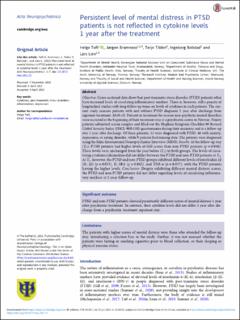| dc.description.abstract | Objective: Cross-sectional data show that post-traumatic stress disorder (PTSD) patients often have increased levels of circulating inflammatory markers. There is, however, still a paucity of longitudinal studies with long follow-up times on levels of cytokines in such patients. The current study assesses patients with and without PTSD diagnosis 1 year after discharge from inpatient treatment. Methods: Patients in treatment for serious non-psychotic mental disorders were recruited at the beginning of their treatment stay at a psychiatric centre in Norway. Ninety patients submitted serum samples and filled out the Hopkins Symptom Checklist-90 Revised Global Severity Index (HSCL-90R GSI) questionnaire during their mainstay and at a follow-up stay 1 year after discharge. Of these patients, 33 were diagnosed with PTSD, 48 with anxiety, depression, or eating disorder, while 9 patients had missing data. The patients were diagnosed using the Mini-International Neuropsychiatric Interview (MINI). Results: At the follow-up stay (T3), PTSD patients had higher levels of GSI scores than non-PTSD patients (p = 0.048). These levels were unchanged from the year before (T2) in both groups. The levels of circulating cytokines/chemokine did not differ between the PTSD and non-PTSD patients at T3. At T2, however, the PTSD and non-PTSD groups exhibited different levels of interleukin 1β (IL-1β) (p = 0.053), IL-1RA (p = 0.042), and TNF-α (p = 0.037), with the PTSD patients having the higher levels. Conclusion: Despite exhibiting different mental distress scores, the PTSD and non-PTSD patients did not differ regarding levels of circulating inflammatory markers at 1-year follow-up. | en_US |

